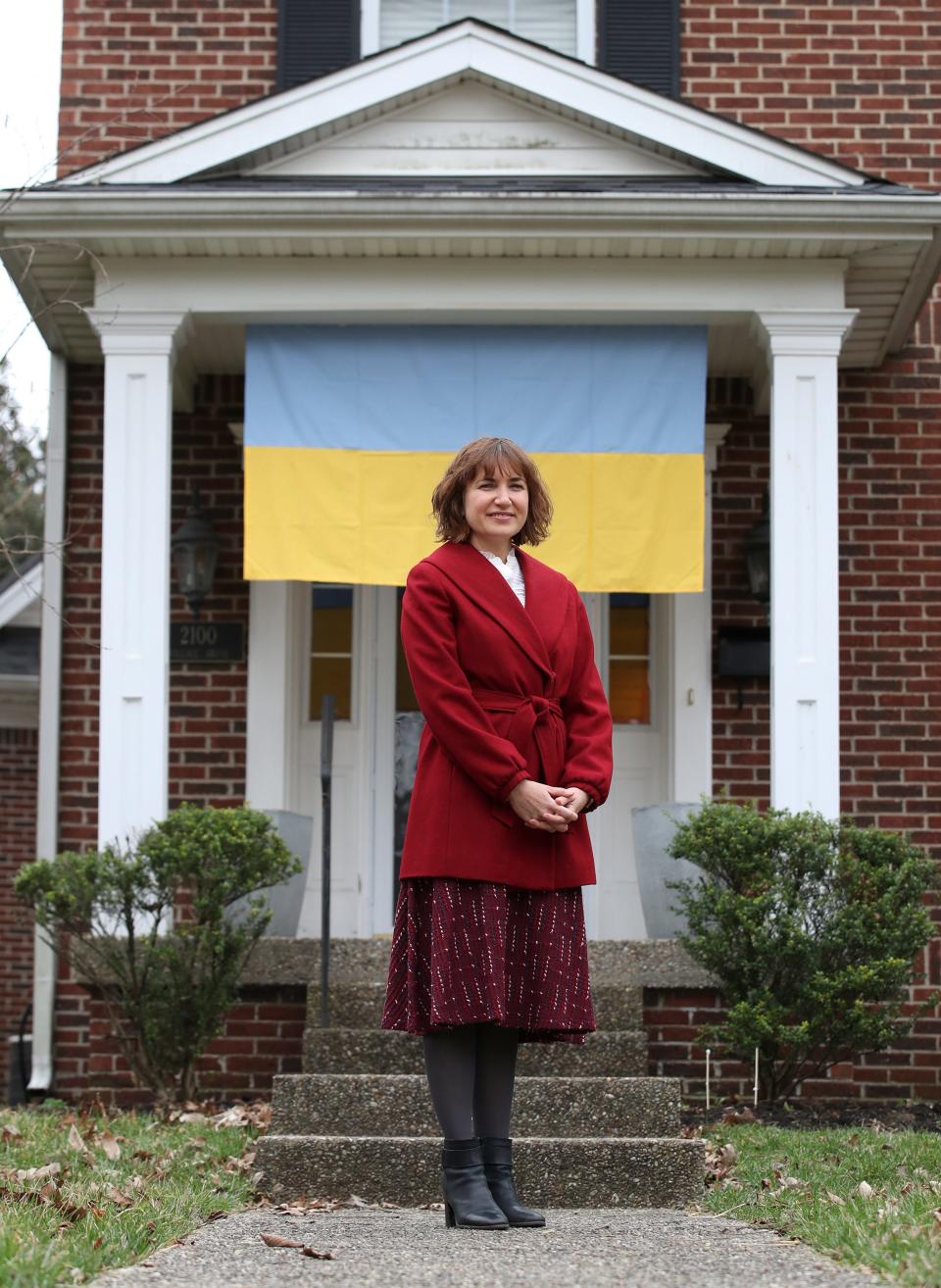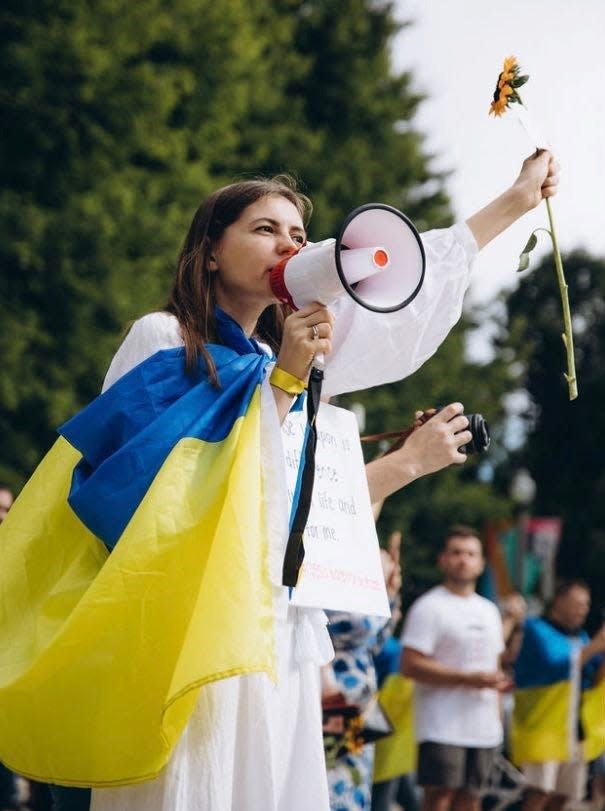Ukraine-Russia war has scattered families worldwide. Hear their stories of survival.
CHICAGO — Every month since the Russian invasion of her homeland, Liliia Popovych has volunteered to work extra shifts at her hospital as a nurse, sending the money to soldiers and Ukrainians affected by war.
Her grandparents, a world away in Ukraine, wake each day to sirens warning of incoming rockets. They lay flowers on the road as car caravans pass by carrying the bodies of fallen soldiers.
So on Wednesday, as Ukrainians gathered in downtown Chicago to commemorate Ukrainian independence with a flag raising, Popovych went to work.
"We're just fighting on our front line here," said Popovych, 30. "I am doing what I can do in diaspora."
Half a year since Russia launched its invasion of Ukraine, USA TODAY reporters reconnected with Ukrainians across the globe who first shared their experiences during the early stages of the war.
While some are struggling under Russian occupation or living amid fierce combat and shelling, others in the U.S. and Europe are adapting to new countries and a new normal. Several said they worry public attention to the war and its human toll is waning.
Here are their stories.
The entire world is losing. Must Ukraine concede the Donbas?
For refugees in the US, long-term survival is a big concern
War crimes: An inside view of Ukraine's push for justice
Ukrainian fighter waits for more ammunition
In southern Ukraine this week, Volodymyr Omelyan attended a memorial ceremony to say goodbye to three close friends killed in a Russian missile strike on the city of Mykolaiv.
"I was with them from the very beginning — from the first day of the war," Omelyan, 43, told USA TODAY on the phone. "It's a shock. But still there is no feeling that we should leave the battlefield."
Omelyan, Ukraine’s former infrastructure minister, joined the nation's volunteer Territorial Defense Forces in the wake of the invasion. In recent months, his unit has been based between the cities of Mykolaiv and Kherson. He lives in a field encampment fortified with machine guns and serves 48-hour rotations.
"We become older — not because of the age but because of challenges we face, the losses of our friends," Omelyan said. "You don't even have time to grieve them and to say sorry. You fight endlessly."
Almost 9,000 Ukrainian "heroes" have died in the war, said Valeriy Zaluzhny, commander-in-chief of the Ukraine military, on Monday.
OPINION: She is 8 years old. I ask her what the war in Ukraine is like. 'Terrible,' she says.
Omelyan said many of his friends have not seen their families since the beginning of the war. His wife has made two briefs visits to Ukraine, but he wants his family to stay abroad for now, especially fighting rages around a Russian-occupied nuclear power plant in Zaporizhzhia.
"The best thing is that we are alive," Omelyan said. There are "still severe fights are ahead."
"We are still waiting for additional western ammunition and artillery," he said.
USA TODAY first interviewed Omelyan in April when he shared his experiences in the town of Borodyanka. Read more here.
Risks and murky futures in occupied Kherson
With Ukrainian forces targeting bridges near their home in Kherson to cut Russian supply lines, two of Yuliya Makiyevskaya’s family members decided earlier this month it was time to flee their city – despite the risks.

Makiyevskaya, 40, who immigrated to the U.S. as a teen, has kept in near-daily touch with her brother, Valeriy, 58. He, his wife, son and daughter-in-law have lived for months under Russian occupation in Kherson, a southern port city on the Dnieper River.
At various times since Russian soldiers took the city in March, they have faced internet outages, curfews and shortages of food and medicine. Today, artillery still flies overhead at night in the first major Ukrainian city to be occupied, she said.
Her brother and his wife decided they would remain in Kherson, worried about his medical problems and losing ownership of his only home. But her nephew and his wife, afraid of being caught in a potential counter-attack, decided to flee, paying to join another family to undertake a "nerve-wracking," four-day journey through tense checkpoints. They reached relative safety in Odesa in early August, Makiyevskaya said.
There, they found some signs of normalcy, like a reopened opera house, the ability to see an eye doctor and new hopes to get a passport to leave the country.
But in a starkly different daily reality that's common among dispersed families, Makiyevskaya said her brother "is not able to leave his apartment, not able to work and has lost all of the things near and dear to him."
Despite fears Russia may hold a referendum as a pretext to annex Kherson, the family still holds out hope that Ukraine can fulfill its vow to liberate their hometown. But Makiyevskaya is worried that critical U.S. public attention is waning, which could undercut support as the war continues to wear down her brother.
"I just spoke to him yesterday. He broke down again crying," she said. "Ukrainian men are typically extremely stoic. It's a big deal when a man cries. So yeah. It's hard."
USA TODAY interviewed Makiyevskaya in May as Russia's actions to cement control ramped up. Read more here.
In Kyiv, signs of normalcy mix with threats
In Kyiv, Mariia Bilous, 18, said life in recent weeks had shown signs of near normalcy, with people dining at restaurants and going to work.
It’s a sharp contrast to about five months earlier when Russian troops pressed to reach Kyiv. She and her boyfriend fled to Andriivka, a village outside of the capital – only to escape after a terrifying March night of interrogation by Russian soldiers.
They returned to the capital along with those who fled to other countries who felt safe or ran out of money, she said. While some seem to have "forgot about the war" gripping other parts of Ukraine, its presence hit home again this week when the Ukrainian government banned independence celebrations amid warnings of possible missile strikes and other attacks. It follows public outcry in Russia over a car bomb that killed a hardline Russian commentator outside Moscow on Saturday.
She wants to attend university in Warsaw, Poland. But all the uncertainty is making it difficult for the young couple to move forward with their education and hopes to begin new careers.
Work is hard to find for the former pastry cook who relies on her family to support her: "If you had a job before the war, then you are lucky if it remains," she said.
This spring, Bilous said "victory is getting close," hoping life would soon return to normal. Six months later, that prospect may be as distant as ever.
USA TODAY interviewed Bilous in April after Russian forces pulled back from outside Kyiv leaving behind grisly scenes of dead civilians that sparked global outrage. Read more here.
Evacuees struggle with depression, loss of identity
Alena Mustiats and her daughter fled Odesa shortly after the invasion, evacuating to a Catholic Charities shelter in Moldova's capital city of Chisinau. Almost six months later, Mustiats has a job assisting other refugees, making a new life in a city she never expected to call home.
"I can say I am enjoying my life here. But I'm always thinking about my city," Mustiats, 40, said via WhatsApp, a popular mobile phone messaging platform. "I wish so much to return home when there is an end to this terrible military attack from Russia. But now it's not safe to go home."
Before they fled Odesa in March, Mustiats taught her 5-year-old daughter to grab her emergency backpack anytime she heard air-raid sirens. Sonya thought it was a game, a game they no longer have to play in the safety of Moldova, where about 500,000 Ukrainians fled, although most have now dispersed elsewhere in Europe.
Mustiats said many of the refugees she's talked to are depressed or sad, sitting around waiting to go home, with no sense of purpose. Mustiats credits her job – she got her first paycheck last week – with keeping her busy and focused on the future.
Still, she wonders when she'll even get home, or what Odesa will look like when she does, given the frequent Russian attacks. "People want to go home. It's not easy," she said.
USA TODAY first met and interviewed Mustiats in March during a reporting trip to Moldova and Ukraine. Read more here.
Bucha survivor's new challenges in Germany
Diana Guloz, 35, was pregnant when she barely survived the fighting and temporary Russian takeover of Bucha this spring.
She's now living near Stralsund, Germany, with her 3-month-old son, Ellis, her parents and 87-year-old grandmother – and she's getting therapy for post-traumatic stress, she told USA TODAY via Whatsapp this week.
Still fresh are the emotional scars of her experience in Bucha – watching the roof of her friends' home collapse as fighting between Russian tanks and Ukrainian forces raged starting Feb. 27.
Before she finally was evacuated on March 10, she spent a harrowing few weeks in a city without electricity and gas and was scared of being shot or raped by Russian soldiers.
While destroyed buildings remain, she said, life in Bucha has improved after clean-ups, de-mining by the Ukrainian army and war-crimes investigations. The friend with whom she sheltered in Bucha is now in the United Kingdom, while the friend's husband returned to Bucha to pick up the pieces.
War crimes trials could lead to international courts. But could they lead to Putin?
Many "lost their apartments, houses (and) some of them lost relatives and friends," she said, citing cases of "cruel war murders."
While her family is getting by on assistance in Germany, she wants to return to Kyiv, where she used to be a language teacher. Amid this week’s threats of missile strikes, she said instead she’s working to speak better German.
"I’d like to (get) back to my country as soon as possible," she said. "But I understand my son’s safety is the most important (thing)."
USA TODAY first spoke with Guloz in April when she first arrived in Germany after fleeing Bucha. Read more here.
In Chicago, a nurse fears for loved ones in Ukraine
Popovych learned this week of the death of yet another friend killed in the war – this time, a former neighbor from her hometown who had returned from abroad to fight.

Popovych said she grew up in a small village outside Ivano-Frankivsk in western Ukraine and moved to the U.S. with her mother and two brothers 12 years ago. When war broke out earlier this year, she was sleeping just two to three hours each night, frantically scrolling her phone for updates.
"Then your body just cannot accept anymore. But it doesn't mean we're not in pain anymore," she said.
Popovych said she fears for her grandparents back home. She longs to bring her nearly 2-year-old son to Ukraine to meet them one day.
"Every day we're checking the news and counting the numbers," she said. "Seven people dead. Twelve. Twenty-six. Front of the house was bombed. Two houses were bombed. Shopping mall was bombed."
In recent weeks, Popovych organized two silent protests in downtown Chicago, where hundreds of Ukrainian women gathered in white dresses, holding sunflowers with taped mouths and hands wrapped in blue and yellow ribbons. Popovych said the demonstrations aim to call out social media platforms that downplay news of the war.
"For us, we remember. We remember every single day."
Email Chris Kenning, Grace Hauck and Trevor Hughes and reach them on Twitter at @chris_kenning, @grace_hauck and @TrevorHughes.
This article originally appeared on USA TODAY: War in Ukraine has scattered families months into Russian invasion

